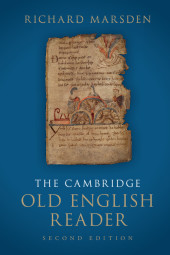
The Cambridge Old English Reader
| Verlag | Cambridge University Press |
| Auflage | 2015 |
| Seiten | 614 |
| Format | 15,4 x 22,9 x 3,3 cm |
| Gewicht | 877 g |
| Artikeltyp | Englisches Buch |
| ISBN-10 | 1107641314 |
| EAN | 9781107641310 |
| Bestell-Nr | 10764131UA |
This groundbreaking reader of Old English prose and verse has been extensively revised for the second edition.
Klappentext:
This reader remains the only major new reader of Old English prose and verse in the past forty years. The second edition is extensively revised throughout, with the addition of a new 'Beginning Old English' section for newcomers to the Old English language, along with a new extract from Beowulf. The fifty-seven individual texts include established favourites such as The Battle of Maldon and Wulfstan's Sermon of the Wolf, as well as others not otherwise readily available, such as an extract from Apollonius of Tyre. Modern English glosses for every prose-passage and poem are provided on the same page as the text, along with extensive notes. A succinct reference grammar is appended, along with guides to pronunciation and to grammatical terminology. A comprehensive glossary lists and analyses all the Old English words that occur in the book. Headnotes to each of the six text sections, and to every individual text, establish their literary and historical contexts, and illustrate the rich cultural variety of Anglo-Saxon England. This second edition is an accessible and scholarly introduction to Old English.
Rezension:
Review of previous edition: '... offering a bountiful assortment of diverse texts thoughtfully edited for basic students of Old English. The book seems to arise from a long and dedicated engagement with Old English pedagogy, and its sheer diversity and breadth of scope makes it likely that almost any teacher of Old English will find something in it of value ... The rich banquet found in the Cambridge [Old English] Reader would not easily be exhausted in a semester, or even a year-long course in Old English; it is sure to inspire in both students and teachers alike a fresh dedication to the work of understanding Anglo-Saxon England.' R. Liuzza, The Medieval Review
